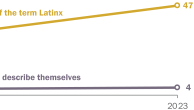The official term on the census form is “Hispanic” or “Latino,” but that label does not match the self-description of most U.S. residents who trace their roots to Spanish-speaking countries, according to a new Pew Hispanic Center survey. Nor do most Latino adults believe that Hispanics in the U.S. share a common culture.
Only 24% of Hispanic adults say they prefer the term “Hispanic” or “Latino” to describe themselves. A slight majority (51%) use their family’s country of origin, such as “Mexican” or “Cuban,” to describe themselves. Another 21% prefer “American.” These responses vary by generation: Immigrants (62%) are most likely to prefer a country-of-origin description. “American” is the plurality (48%) choice of Hispanics who are more distant from the immigrant experience, those born in the U.S. whose parents also are U.S. born. As for whether “Hispanic” or “Latino” is better, about half (51%) say they have no preference, but among those who do, “Hispanic” (33%) is favored over “Latino” (14%).
When asked whether Hispanics or Latinos in the U.S. share a common culture or have many different cultures, a large majority of most subgroups respond that there are many different cultures. This preference is found across all immigrant generations, among both English- and Spanish-speaking Latinos and among Hispanics of differing education levels. The survey also found that most Hispanics do not see themselves as fitting into the standard racial categories used by the Census Bureau and other government agencies. Hispanics also are evenly split on whether they see themselves as typical Americans, or not.
As the report states, “Nearly four decades after the United States government mandated the use of the terms “Hispanic” or “Latino” to categorize Americans who trace their roots to Spanish-speaking countries, a new nationwide survey of Hispanic adults finds that these terms still haven’t been fully embraced by Hispanics themselves.”
The survey report also includes findings on the immigration experience of Hispanics; on Spanish or English language use by immigrant generation; on social attitudes of Hispanics, compared with those of the general public; and on political views of Latinos, compared with the general public.




